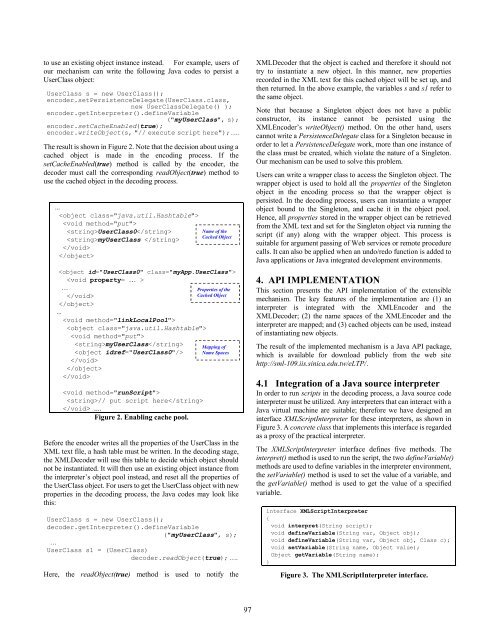4th International Conference on Principles and Practices ... - MADOC
4th International Conference on Principles and Practices ... - MADOC
4th International Conference on Principles and Practices ... - MADOC
Create successful ePaper yourself
Turn your PDF publications into a flip-book with our unique Google optimized e-Paper software.
to use an existing object instance instead. For example, users of<br />
our mechanism can write the following Java codes to persist a<br />
UserClass object:<br />
UserClass s = new UserClass();<br />
encoder.setPersistenceDelegate(UserClass.class,<br />
new UserClassDelegate() );<br />
encoder.getInterpreter().defineVariable<br />
("myUserClass", s);<br />
encoder.setCacheEnabled(true);<br />
encoder.writeObject(s, "//executescripthere"); ….<br />
The result is shown in Figure 2. Note that the decisi<strong>on</strong> about using a<br />
cached object is made in the encoding process. If the<br />
setCacheEnabled(true) method is called by the encoder, the<br />
decoder must call the corresp<strong>on</strong>ding readObject(true) method to<br />
use the cached object in the decoding process.<br />
...<br />
<br />
<br />
UserClass0<br />
myUserClass <br />
<br />
<br />
<br />
<br />
…<br />
<br />
<br />
...<br />
<br />
<br />
<br />
myUserClass<br />
<br />
<br />
<br />
<br />
<br />
// put script here<br />
....<br />
Figure 2. Enabling cache pool.<br />
Name of the<br />
Cached Object<br />
Properties of the<br />
Cached Object<br />
Mapping of<br />
Name Spaces<br />
Before the encoder writes all the properties of the UserClass in the<br />
XML text file, a hash table must be written. In the decoding stage,<br />
the XMLDecoder will use this table to decide which object should<br />
not be instantiated. It will then use an existing object instance from<br />
the interpreter’s object pool instead, <strong>and</strong> reset all the properties of<br />
the UserClass object. For users to get the UserClass object with new<br />
properties in the decoding process, the Java codes may look like<br />
this:<br />
UserClass s = new UserClass();<br />
decoder.getInterpreter().defineVariable<br />
("myUserClass", s);<br />
…<br />
UserClass s1 = (UserClass)<br />
decoder.readObject(true); ….<br />
Here, the readObject(true) method is used to notify the<br />
XMLDecoder that the object is cached <strong>and</strong> therefore it should not<br />
try to instantiate a new object. In this manner, new properties<br />
recorded in the XML text for this cached object will be set up, <strong>and</strong><br />
then returned. In the above example, the variables s <strong>and</strong> s1 refer to<br />
the same object.<br />
Note that because a Singlet<strong>on</strong> object does not have a public<br />
c<strong>on</strong>structor, its instance cannot be persisted using the<br />
XMLEncoder’s writeObject() method. On the other h<strong>and</strong>, users<br />
cannot write a PersistenceDelegate class for a Singlet<strong>on</strong> because in<br />
order to let a PersistenceDelegate work, more than <strong>on</strong>e instance of<br />
the class must be created, which violate the nature of a Singlet<strong>on</strong>.<br />
Our mechanism can be used to solve this problem.<br />
Users can write a wrapper class to access the Singlet<strong>on</strong> object. The<br />
wrapper object is used to hold all the properties of the Singlet<strong>on</strong><br />
object in the encoding process so that the wrapper object is<br />
persisted. In the decoding process, users can instantiate a wrapper<br />
object bound to the Singlet<strong>on</strong>, <strong>and</strong> cache it in the object pool.<br />
Hence, all properties stored in the wrapper object can be retrieved<br />
from the XML text <strong>and</strong> set for the Singlet<strong>on</strong> object via running the<br />
script (if any) al<strong>on</strong>g with the wrapper object. This process is<br />
suitable for argument passing of Web services or remote procedure<br />
calls. It can also be applied when an undo/redo functi<strong>on</strong> is added to<br />
Java applicati<strong>on</strong>s or Java integrated development envir<strong>on</strong>ments.<br />
4. API IMPLEMENTATION<br />
This secti<strong>on</strong> presents the API implementati<strong>on</strong> of the extensible<br />
mechanism. The key features of the implementati<strong>on</strong> are (1) an<br />
interpreter is integrated with the XMLEncoder <strong>and</strong> the<br />
XMLDecoder; (2) the name spaces of the XMLEncoder <strong>and</strong> the<br />
interpreter are mapped; <strong>and</strong> (3) cached objects can be used, instead<br />
of instantiating new objects.<br />
The result of the implemented mechanism is a Java API package,<br />
which is available for download publicly from the web site<br />
http://sml-109.iis.sinica.edu.tw/eLTP/.<br />
4.1 Integrati<strong>on</strong> of a Java source interpreter<br />
In order to run scripts in the decoding process, a Java source code<br />
interpreter must be utilized. Any interpreters that can interact with a<br />
Java virtual machine are suitable; therefore we have designed an<br />
interface XMLScriptInterpreter for these interpreters, as shown in<br />
Figure 3. A c<strong>on</strong>crete class that implements this interface is regarded<br />
as a proxy of the practical interpreter.<br />
The XMLScriptInterpreter interface defines five methods. The<br />
interpret() method is used to run the script, the two defineVariable()<br />
methods are used to define variables in the interpreter envir<strong>on</strong>ment,<br />
the setVariable() method is used to set the value of a variable, <strong>and</strong><br />
the getVariable() method is used to get the value of a specified<br />
variable.<br />
interface XMLScriptInterpreter<br />
{<br />
void interpret(String script);<br />
void defineVariable(String var, Object obj);<br />
void defineVariable(String var, Object obj, Class c);<br />
void setVariable(String name, Object value);<br />
Object getVariable(String name);<br />
}<br />
Figure 3. The XMLScriptInterpreter interface.<br />
97





